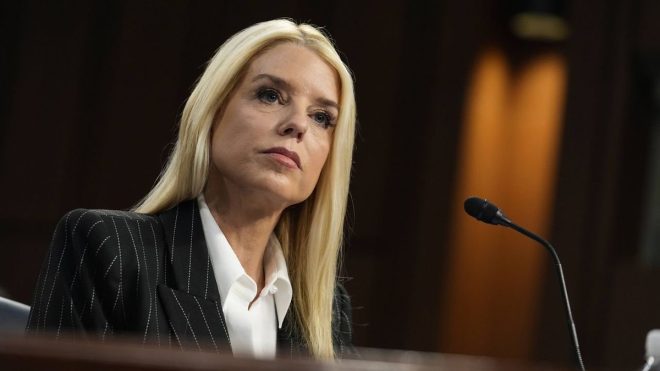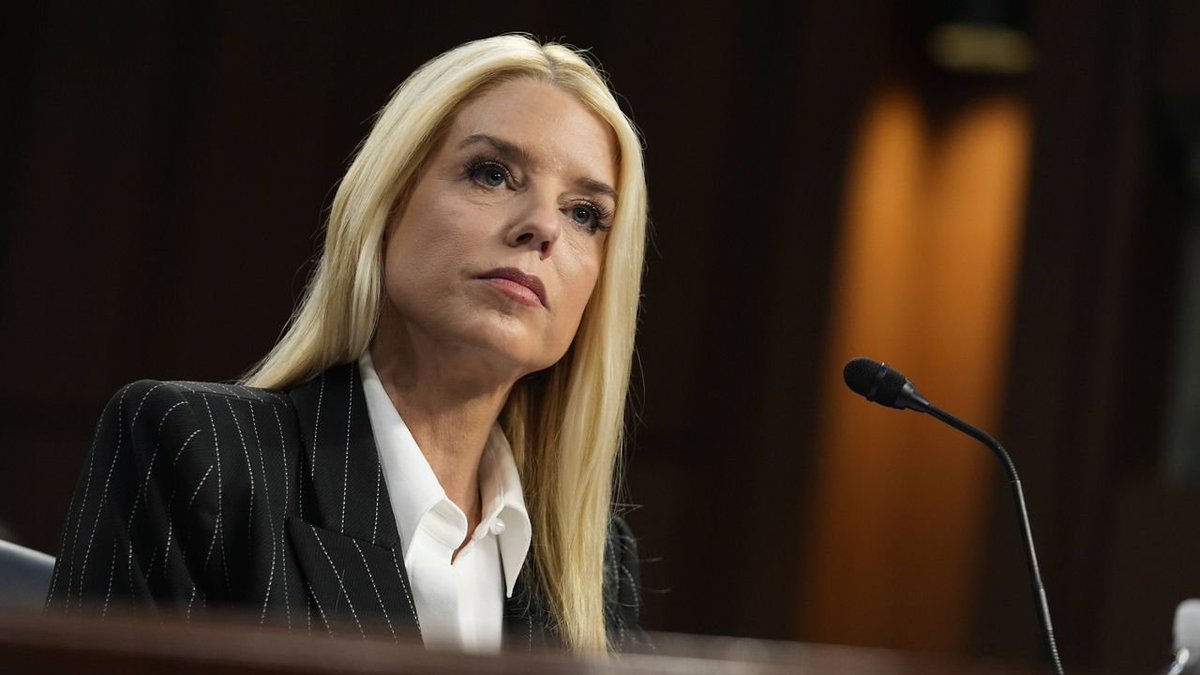
Breaking News: Pam Bondi’s Bold Declaration on Administrative Law Judges
In a significant legal and political development, Pam Bondi, a prominent figure in the legal arena, has publicly declared that the restrictions protecting administrative law judges from removal are unconstitutional. This announcement has far-reaching implications, particularly for President Trump’s administration, as it opens the door for potential dismissals of judges deemed to be undermining the Constitution.
Understanding the Context
Administrative law judges (ALJs) play a critical role in the federal bureaucracy, overseeing a range of administrative proceedings that affect various sectors, including immigration, labor, and environmental regulation. Traditionally, these judges have enjoyed a level of job security that makes it difficult for them to be removed from their positions. This protection was designed to ensure impartiality and independence in their decision-making processes.
However, Bondi’s assertion challenges this long-standing norm, suggesting that current protections may hinder effective governance and accountability within the judicial system. By declaring these restrictions unconstitutional, she has positioned herself as a key player in a contentious legal debate that could reshape the landscape of administrative law.
Implications for the Trump Administration
With Bondi’s declaration, the Trump administration now has the leverage to remove ALJs who are perceived to be acting against the interests of the administration or, more broadly, the Constitution. This move could be seen as an attempt to exert greater control over the judiciary, particularly in areas where federal regulations have been a point of contention.
- YOU MAY ALSO LIKE TO WATCH THIS TRENDING STORY ON YOUTUBE. Waverly Hills Hospital's Horror Story: The Most Haunted Room 502
Critics of Bondi’s stance argue that such actions could lead to a politicization of the judiciary, undermining the independence that is crucial for fair and impartial adjudication. They fear that the potential for removal based on political motivations could compromise the integrity of administrative law, leading to decisions influenced by executive power rather than legal merit.
The Political Landscape
This declaration comes at a time when the political environment is rife with tension and division. The Trump administration has faced numerous legal challenges, and the relationship between the executive branch and the judiciary has been increasingly scrutinized. By taking this step, Bondi aligns herself with a broader narrative that seeks to redefine the boundaries of executive power and judicial independence.
Supporters of Bondi’s stance argue that it is essential to hold judges accountable for their actions, particularly if they are perceived to be overstepping their bounds or engaging in judicial activism. They contend that the Constitution must be upheld, and any judicial actions that appear to undermine its principles should be addressed swiftly.
Public Reaction
The announcement has sparked a range of reactions from various stakeholders. Legal experts, political analysts, and the public are weighing in on the potential consequences of Bondi’s declaration. Some view it as a necessary correction to an overreaching judicial system, while others see it as a dangerous precedent that could erode the foundational principles of judicial independence.
Social media platforms, particularly Twitter, have become a hotbed for discussions surrounding this issue. Many users are expressing their opinions on Bondi’s decision, with some praising her bravery while others are condemning her actions as a threat to democracy and the rule of law.
Future Outlook
As this situation unfolds, it remains to be seen how the legal community and the broader public will respond to Bondi’s declaration. Will other legal leaders follow suit, or will there be pushback from within the judiciary? The potential for legal battles over this issue is high, and the implications could extend far beyond the immediate context of administrative law judges.
In the coming weeks and months, it will be crucial to monitor how this declaration impacts ongoing legal proceedings and the relationships between various branches of government. The balance of power in the U.S. government is always a delicate matter, and any shifts in that balance will have lasting effects on the legal landscape.
Conclusion
Pam Bondi’s declaration regarding the unconstitutionality of restrictions protecting administrative law judges from removal is a pivotal moment in the ongoing discourse about judicial independence and executive power. As the Trump administration considers its next steps, the implications of this decision will reverberate through the legal system and beyond.
The evolving political landscape and public reaction will shape how this issue is navigated in the months to come. Whether this leads to a more accountable judiciary or a politicized legal system remains to be seen, but one thing is clear: this development marks a significant chapter in the ongoing dialogue about the role of the judiciary in American governance.
As we continue to watch this situation unfold, it is imperative for all stakeholders to engage thoughtfully in the discussions that will shape the future of administrative law and its intersection with constitutional principles. The stakes are high, and the outcomes will likely influence the legal framework for years to come.

BREAKING: Pam Bondi just declared that restrictions shielding administrative law judges from removal are unconstitutional and will no longer defend them in court.
This allows President Trump to fire those who have been secretly perverting the Constitution.
I would also like to… pic.twitter.com/t3yUK3Hnus
— George (@BehizyTweets) February 21, 2025
BREAKING: Pam Bondi’s Bold Declaration on Administrative Law Judges
Recently, Pam Bondi made headlines with a significant announcement that has stirred the political waters: she declared that the restrictions shielding administrative law judges from removal are unconstitutional and stated that she would no longer defend these judges in court. This statement opens the door for President Trump to potentially remove judges who have allegedly been “secretly perverting the Constitution.” It’s a bold move that raises many questions about the implications for judicial independence and the broader political landscape.
But what does this really mean? Let’s dive deeper into the context, the implications of this decision, and how it affects the judicial system and political dynamics in the United States.
The Context of Pam Bondi’s Statement
To understand the weight of Pam Bondi’s declaration, we need to look at the role of administrative law judges (ALJs) in the U.S. legal system. ALJs are crucial players in the administrative process, overseeing disputes in various areas, including immigration, social security, and environmental regulations. They are intended to be impartial arbiters, ensuring fair hearings and decisions based on evidence and law.
However, Bondi’s assertion that the restrictions preventing their removal are unconstitutional raises significant concerns. Critics argue that such a move could undermine the independence of the judiciary, opening the floodgates for politically motivated removals. The idea that President Trump, or any president, could fire judges at will based on their decisions or beliefs is alarming to many who value judicial independence as a cornerstone of democracy.
The Potential Impact on Judicial Independence
The implications of this decision are profound. Allowing the executive branch to have more control over the judiciary could lead to a breakdown of the checks and balances that are essential in a democratic system. Bondi’s statement suggests a shift towards a more politicized judicial environment, where judges may feel pressured to align their decisions with executive preferences to avoid removal.
This situation could create a chilling effect on the judicial process, where judges may hesitate to make unpopular decisions, fearing repercussions. Critics of Bondi’s declaration point out that this could result in a judiciary that lacks the necessary independence to uphold the Constitution and protect the rights of individuals against government overreach.
Reactions from Legal Experts and Politicians
The legal community has responded with a mix of concern and criticism regarding Bondi’s comments. Many legal experts argue that the independence of administrative law judges is critical to maintaining a fair and impartial legal system. The American Bar Association and various legal scholars have voiced their apprehensions, emphasizing the need for independent judiciary to safeguard against political interference.
Moreover, politicians from both sides of the aisle are weighing in on this issue. Some Republican leaders support Bondi’s stance, viewing it as a necessary step towards accountability in the judiciary. On the other hand, many Democrats and some moderate Republicans are alarmed by the potential consequences, warning that this could set a dangerous precedent for future administrations.
The Role of Administrative Law Judges
To fully appreciate the stakes involved, it’s essential to understand the role of administrative law judges in the U.S. They serve as impartial referees in disputes between individuals and government agencies. Their decisions can have significant impacts on people’s lives, affecting everything from social security benefits to environmental regulations.
When judges are perceived to be at risk of removal for their decisions, it could lead to a lack of confidence in the system. People may question whether they will receive a fair hearing or if a judge will be in a position to make an unbiased ruling. This perception can erode trust not only in the judiciary but also in the entire governmental framework.
President Trump’s Potential Actions
With Pam Bondi’s declaration, the ball is now in President Trump’s court. He has the authority to remove judges if he chooses to do so, which raises questions about which judges might be targeted and for what reasons. The legal community is watching closely to see if Trump will act on this opportunity and how such actions might be justified.
If President Trump begins to remove judges based on their rulings or perceived biases, it could lead to significant backlash from both the public and the legal community. The potential for a judiciary that reflects the views of the executive branch rather than the law itself poses a risk to the integrity of the judicial system.
The Future of Administrative Law Judges
Looking ahead, the future of administrative law judges in the U.S. is uncertain. If the current trajectory continues, there may be a push to reform the system to protect judges from political interference. Advocates for judicial independence are likely to mobilize, calling for legislative measures to ensure that judges can perform their duties without fear of retribution.
Moreover, this situation could catalyze broader discussions about judicial reform and the role of the judiciary in a democratic society. As citizens, it’s crucial to stay informed and engaged in these conversations, as they directly affect our rights and the functioning of our government.
Engaging the Public in the Discussion
As this situation unfolds, public discourse will play a vital role. Engaging in discussions about the independence of the judiciary, the role of administrative law judges, and the implications of political interference can help raise awareness of these critical issues. It’s essential to understand how these developments affect not only the judicial system but also the democratic principles that underpin our society.
Whether through social media, community meetings, or discussions with friends and family, staying informed and advocating for a fair judiciary is a responsibility we all share. The balance of power in our government is delicate, and maintaining judicial independence is crucial for upholding the rule of law.
Conclusion: A Call to Action
Pam Bondi’s declaration that restrictions shielding administrative law judges from removal are unconstitutional marks a pivotal moment in U.S. legal history. It raises serious concerns about the future of judicial independence and the potential for politicization of the judiciary. As citizens, it’s essential to remain vigilant and engaged in these discussions, advocating for a fair and impartial judicial system that upholds the Constitution and protects our rights.
By understanding these issues and their implications, we can better participate in shaping a government that reflects the values of justice, fairness, and accountability. The future of our judicial system depends on our collective commitment to ensuring its integrity. Let’s keep the conversation alive and advocate for the principles that define our democracy.
